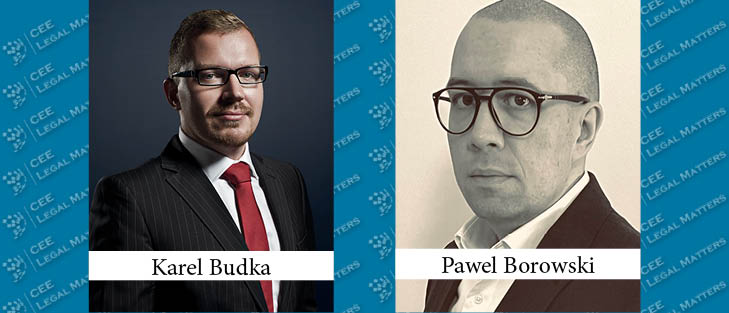In a world where business operations frequently cross borders, the role of legal strategy becomes critical in navigating complex regulatory and political landscapes. Drawing on their professional experience, Envista Holdings Corporation Senior Legal Counsel Karel Budka and Head of General Legal at Zentiva Pawel Borowski held talks at the CEE Legal Matters GC Summit that took place in Warsaw on April 25-26, 2024. Budka explored the depths of managing foreign direct investment subsidy applications and Borowski looked at the implications of adapting to evolving sanctions.
Legal Preparation and Strategy
As part of his presentation on FDI subsidy applications, Budka focused on his company’s initiative to expand manufacturing operations to a remote area in the Czech Republic. Highlighting the use of government subsidies as a facilitator for growth, Budka explored the multi-hurdled path they had to navigate as well as which strategic approaches helped him along the way.
In the beginning, Budka emphasized the critical importance of integrating legal advice from the very beginning of the project planning process. By involving legal experts early, the project’s objectives could be aligned with legal requirements, thus smoothing the path forward. “I would always recommend to onboard [legal advisors] as soon as possible,” Budka advised. “Such practices were crucial for identifying potential legal obstacles and ensuring they aligned with the company’s strategic aims.”
Moreover, Budka stressed the importance of comprehending both the legislation and its practical applications. He noted: “the crucial part, which is always there, is what’s the difference between the law on paper everyone can read and the real-life application of it.” Furthermore, he focused on strategic considerations necessary for structuring effective subsidy applications. This process involved choosing between various subsidy types and planning financial investments to meet government criteria favorably. “Here, the process of application came in handy with the discussion with the business,” he stressed, adding that “strategic financial planning was crucial for this stage.”
Challenges and Political Dynamics
After discussing strategic planning, Budka delved into the unpredictability of political factors, showing how these can complicate the subsidy application process. He outlined the challenges one could face when dealing with bureaucratic processes and political influences, which often introduced a level of unpredictability into the subsidy application process. He zeroed in on the complexities of aligning business practices with government expectations and the unpredictable nature of governmental decision-making. “Since in our example we were focusing on a manufacturing facility for intragroup production, there were also transfer pricing policies and all these things that added further layers of complexity,” he said, reflecting on the specific challenges he faced. “The nuanced interactions with government officials who may have had their agendas or specific political motivations took this minefield to another level, so threading carefully was paramount.”
Finally, Budka stressed the importance of managing expectations within the company and preparing for the political realities that may influence the subsidy award. His experience underscored the “necessity of understanding the full scope of government interactions, including informal negotiations and the potential for discretionary decisions. I would have advised remaining vigilant and proactive at all times, given the political and bureaucratic hurdles that can significantly affect the outcome of subsidy applications,” he said in conclusion.
Complexities of International Sanctions
In his presentation titled Strategic Solutions - Adapting to Evolving Sanctions, Borowski began by setting the stage for the challenges faced by global enterprises. “The complexity arises not just from the number of countries the companies may operate in, but the intricate interplay of different sanction regimes, each with its nuances and legal expectations,” he said.
“The backbone of strategic compliance lies in understanding and leveraging the specific exclusions and licenses available under various sanctions frameworks, such as those issued by the US Office of Foreign Assets Control and the European Union,” he went on to say. Despite these mechanisms, Borowski emphasized that, “the landscape is getting more and more complex. The companies may benefit from certain exclusions and licenses, yet, the situation remains fraught with legal pitfalls.”
Illustrating the severe consequences of non-compliance, Borowski shared recent legal cases. “In the Netherlands, there was a case where a violation led to 18 months in prison and a significant fine,” he highlighted, saying that such cases should serve as stark reminders of the importance of robust compliance programs.
Proactivity and Adaptation Are Key
Moving beyond the initial compliance challenges, Borowski outlined the proactive measures companies must adopt to stay ahead of international sanctions.
For businesses, the key to managing these risks is not just reactive compliance but proactive engagement with legal norms and changes. “It’s crucial we keep up with multiple discussions with external counsels to ensure our practices meet the best standards,” Borowski advised. This involves regular updates and audits of compliance programs to align with the dynamic sanctions landscape.
Specifically, Borowski explained that effective compliance extends beyond mere adherence to legal mandates. “It requires a concerted effort within all levels of a company to ensure that every employee, from top management down, understands and implements the necessary policies. Training programs, regular updates, and strategic communication are essential components of a successful compliance framework,” he shared. Moreover, the integration of advanced technological tools plays a critical role. Dynamic screening and monitoring systems that offer real-time updates and alerts about changes in sanctions lists and regulations can significantly enhance a company’s ability to respond promptly and effectively to potential risks.
Looking ahead, Borowski underscored the necessity for continuous adaptation. “As sanctions evolve, so must our strategies. The key is not just to comply but to stay ahead of the curve in understanding and implementing changes,” he said. “For legal professionals, this means staying informed about global political developments, understanding detailed regulatory updates, and fostering a proactive culture of compliance within their organizations,” Borowski concluded.





















